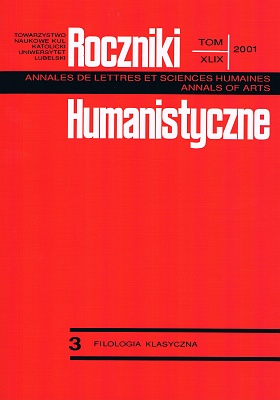Wokół toposu. Stanowisko Arystotelesa w niektórych kwestiach logicznych
Abstrakt
The paper attempts to show the topos against the background of an outline of the theory of reasoning laid by Aristotle in the Topics, Analitycs and in the Rhetoric. Therefore the author considers first such definitional components as property, genus, and accident, and then shows what application these predicables have in propositional formulas, when they may be used as premisses. A further step is to characterize those propositions in the categories of truth and falsehood, knowledge and opinion. Following the idea of the Stagirite, it is stressed that knowledge differs from opinion by the general character and necessity of the premisses by which it is acquired. Therefore from the position of knowledge one decides truthfully, from the position of opinion one may only deduce that something may be true. This means, however, that where one speaks about opinions and nonessential attributes we enter the field which is determined not only by another kind of knowledge, but where this kind of knowledge has its proper tools. So if there, where cognition does not bear the signs of knowledge, and the terms under consideration do not satisfy the requirements which the terms to establish a proper definition should satisfy, one speaks about places, that is topoi, one assumes that the attempt at a description and systematization of probable reasoning is linked with the concept of topos. Hence when it comes to the same kind of knowledge which is revealed in dialectics and rhetoric, one considers the application of topos by the examples placed both in the Topics and in the Rhetoric. An analysis of the selected topoi makes us conclude that the concept of topos turns out to be a coherent part of the Aristotelian theory of reasoning. Thus the postulate to consider it in this light.
Copyright (c) 2001 Roczniki Humanistyczne

Utwór dostępny jest na licencji Creative Commons Uznanie autorstwa – Użycie niekomercyjne – Bez utworów zależnych 4.0 Międzynarodowe.





